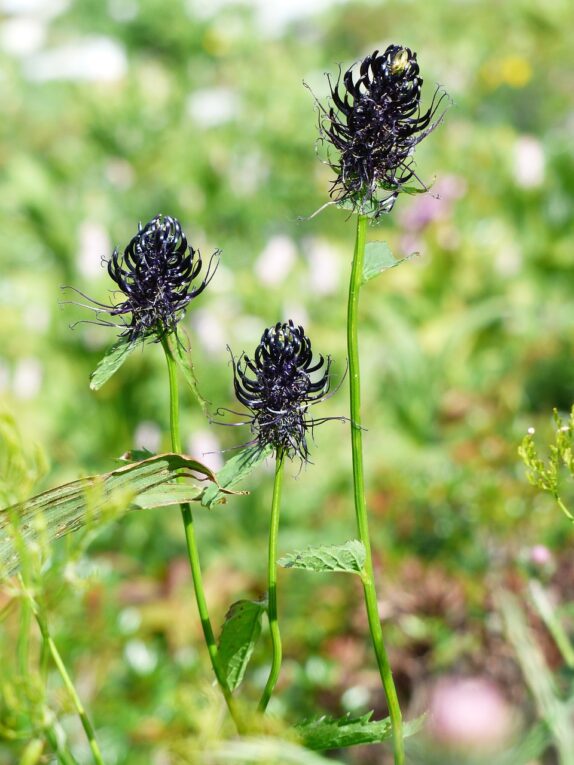Devil’s Claw, (Harpagophytum procumbens), is a plant native to the southern regions of Africa, particularly in the Kalahari Desert, Namibia and South Africa. It is named for the distinctive appearance of its fruit, which is covered in hook-like projections, resembling claws.
The plant has a long history of traditional use among indigenous peoples in Africa for various medicinal purposes. The root is the part of the plant most commonly used medicinally.
Devil’s Claw for Pain Relief
Devil’s Claw has been a popular anti-inflammatory and arthritis treatment since is was first discovered in South Africa by European colonists in the 18th century. It is still quite common in Europe today but is not well known in the U.S.
Recently published double blind studies have shown that Devil’s Claw can relieve pain from arthritis in as little as ten days of use (lower back, knee and hip pain included).
Devil’s Claw is approved as a nonprescription medicine by the German Commission E (an expert panel of physicians and pharmacists who advise Germany’s counterpart of the U.S. Food and Drug Administration). It is used to; relieve arthritis, lower back, knee and hip pain, osteoarthritis, rheumatoid arthritis, gout, bursitis, tendonitis and soft tissue pain (muscle aches) and degenerative disorders of the loco-motor system (to treat pain and inflammation in the joints).
Devil’s Claw for Digestive Disorders
Devil’s Claw has also been approved for use in treating ailments including loss of appetite and digestive disorders.
While scientific research on the effects of Devil’s Claw specifically on digestive disorders is limited, some potential mechanisms may explain its traditional use in this regard:
Anti-inflammatory Effects: Devil’s Claw contains compounds, such as iridoid glycosides (including harpagoside), that exhibit anti-inflammatory properties. Inflammatory processes in the gastrointestinal tract are often associated with conditions like gastritis, irritable bowel syndrome (IBS), or inflammatory bowel diseases (IBD). By reducing inflammation, Devil’s Claw may help alleviate symptoms associated with these conditions, such as abdominal pain, bloating, or discomfort.
Analgesic Properties: Devil’s Claw has been traditionally used as a natural analgesic (pain-reliever). Abdominal pain or discomfort associated with digestive disorders, such as gastritis or dyspepsia, may be relieved by the analgesic effects of Devil’s Claw.
Smooth Muscle Relaxation: Some studies suggest that Devil’s Claw may have muscle relaxant properties, which could potentially help alleviate gastrointestinal spasms or cramping associated with digestive disorders.
Stimulation of Digestive Secretions: Devil’s Claw has been reported to have a bitter taste, which is often associated with herbs that stimulate digestive secretions, such as bile and gastric juices. Enhanced secretion of digestive enzymes and acids may aid in the digestion process and relieve symptoms of indigestion or dyspepsia.
Improved Gastric Emptying: Some animal studies have suggested that Devil’s Claw may influence gastric emptying, potentially leading to improved digestion and reduced symptoms of bloating or discomfort after meals.
Devil’s Claw Research
A new clinical study shows that this traditional African medicinal herb may reduce pain associated with osteoarthritis as effectively as some conventional drugs.
In a randomized, double-blind, parallel group study conducted in France, the patients received either capsules containing the herb Devil’s Claw or a pharmaceutical drug. Pain measurements of all patients indicated that those taking the herb and the drug experienced similar benefits. However, the study also showed that patients taking the herb experienced significantly fewer adverse side effects than those taking the drug.
Mark Blumenthal, founder and executive director of the American Botanical Council, a non-profit research and education organization, states, “At least two previous clinical trials on Devil’s Claw have supported its use as in treating lower back pain and rheumatic conditions. This study is significant in that it is the first to show the potential benefits of devil’s claw for osteoarthritis.”
Shopping
| Visit the new SHOPPING page for a wide selection of great products! |
Research Articles:
_1. ESCOP monograph. Fascicule 2: Harpagophyti radix (Devil’s Claw) Exeter, UK: European Scientific Cooperative on Phytotherapy. Double blind study, various types of arthritis. Conclusion: significant pain relief in 10 days of treatment.
2. Chrubasik S., et al Effectiveness of Harpagophyti radix (Devil’s Claw) in treatment of acute low back pain. Phytomedicine 3(1). 1996 Double blind study of soft tissue pain (muscles, tendons) Conclusion: Soft tissue pain relieved.
Always take care when taking herbs and Read Our Disclaimer.
Devil’s Claw Herb Notes / Side Effects
Since studies have shown no major side effects, even at very high doses, Devil’s Claw can be an alternative for those taking over-the-counter pain medications such as Ibuprofen and Acetaminophen, which can cause liver and stomach problems. Devil’s claw can be a healthier approach to treating joint pain.
There appears to be a risk of increased bleeding when Devil’s Claw is taken together with anticoagulant drugs (blood-thinners), such as warfarin (coumadin) and heparin.
Consult your doctor before taking it if you have ulcers, gallstones, a heart problem, pregnant or breast-feeding.
Latin Names
Harpagophytum procumbens, Harpagophyti radix, Uncaria procumbens
Common Names
Devil’s Claw, Grapple Plant, Wood Spider, Harpago, Sengaparile (Tswana), Duiwelsklou (Afrikaans)
Properties of Devil’s Claw
Moderately anti-inflammatory, improves digestion, choleretic, mild analgesic.
Devil’s Claw Uses
Internally for: loss of appetite, supportive therapy of degenerative disorders of the locomotor system, gastric and duodenal ulcers, dyspepsia, peptic ulcers, heartburn, osteoarthritis, tendonitis, indigestion, blood diseases, headache, allergies, lumbago, neuralgia, and fever.
Externally for: sores, ulcers, boils, skin lesions, osteoarthritis, rheumatoid arthritis, gout, bursitis, tendonitis, soft tissue pain (muscle aches).
See also our article on Cat’s Claw.


Leave a Reply